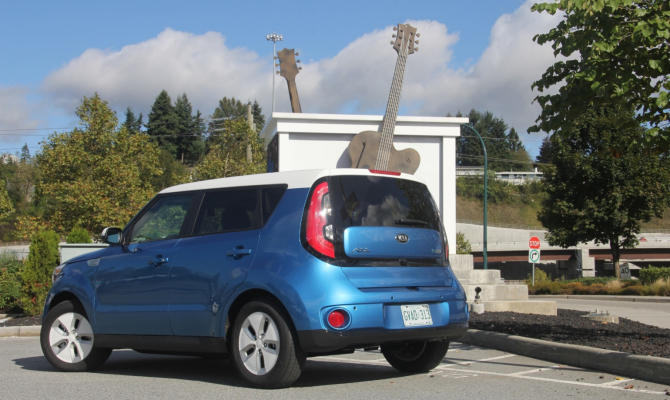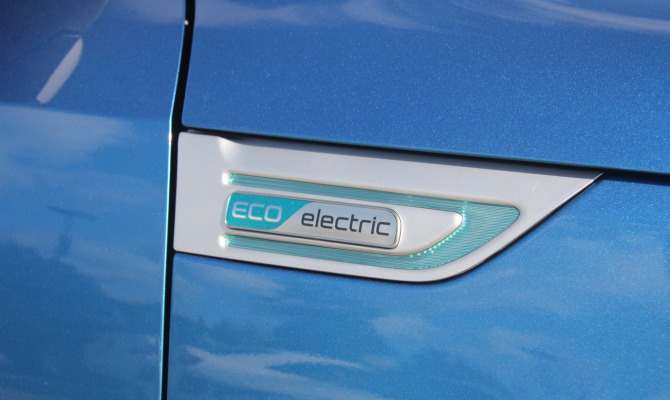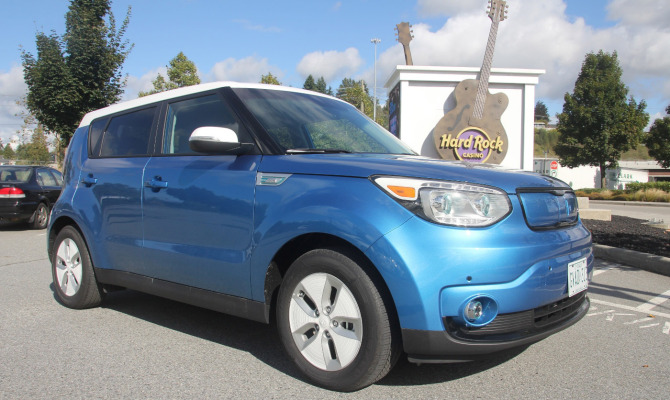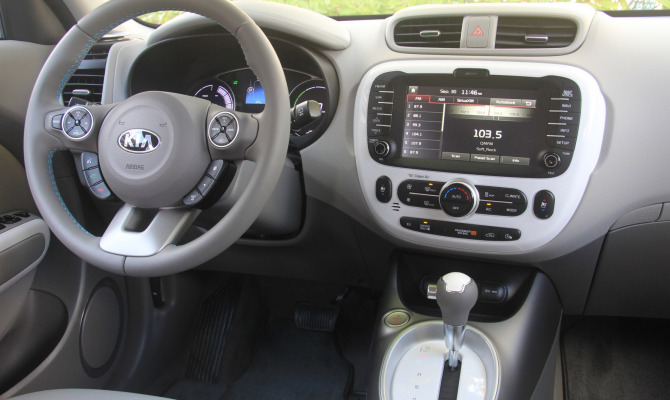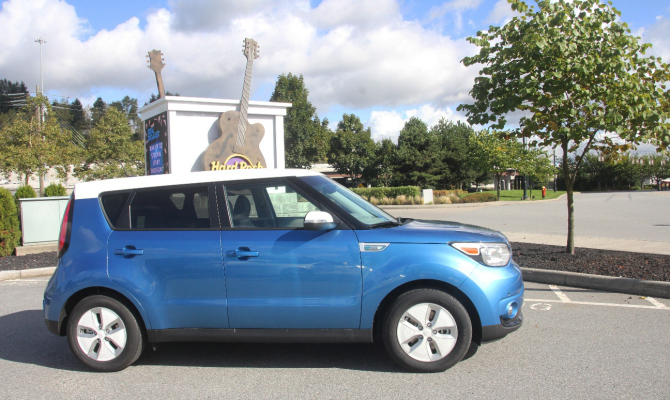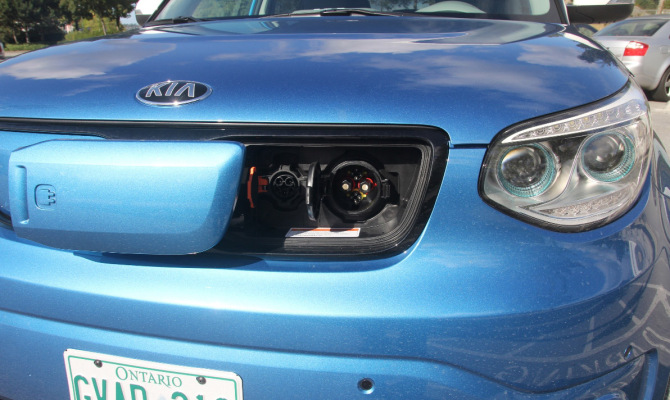“The Kia Soul EV definitely rocks and is a must-drive for anyone considering an EV…”
Kia joins the growing list of electric vehicle (EV) manufacturers with Soul EV, a clever adaptation of its tall 5-door compact with the funky styling.
Although still a small slice of the overall car market, EV sales are growing rapidly and so is the public charge station infrastructure that’s crucial to its success, especially in urban areas.
A digital readout showed 187 km of driving range available as we headed out on a test loop around Metro Vancouver. And after about 30 minutes of, no special treatment, driving with frequent stops, starts, hill climbs and descents, the Soul EV showed 162 km was still available. That’s relevant, as the Soul EV’s officially rated driving range is 149 km.
In addition to being quiet and fuel-free, Soul EV effectively matches the practical user features of its gasoline counterpart. It can seat 4 to 5 passengers and has the same large rear cargo area. Kia’s polymer (electrolyte) lithium ion battery pack is compact and easier to hide than others, as is can be molded into different shapes. In Soul EV it’s centrally fitted under the seats and a raised rear floor pan.
The gasoline engine is replaced by a 109 horsepower liquid-cooled AC synchronous permanent magnet electric motor that can generate a whopping 210 lb-ft of torque. That’s 59 lb-ft more than the 2.0-litre gasoline engine version of Soul. Standing starts were not as jumpy as other electric vehicles tend to be and the overall performance of the electric drivetrain was impressively smooth.
Charger ports for the battery pack are hidden behind a hinged cover in the front grille. The smaller port accepts either a 120 volt (level 1) or a 240 volt (level2) charge connector. A portable level 1 unit is stored in the vehicle and Kia Canada will also provide Soul EV buyers with a level 2 charge unit (made by Bosch) for home installation, free of charge.
The charger unit can also be used to pre-heat or pre-cool the Soul EV, while plugged into the grid. You can also program it to start or complete charging at a certain time. The level 1 charger plugs into any electrical outlet, but can take up to 24-hours to fully recharge the battery pack. A level 2 charger (with 30 amp service) cuts the maximum recharge time to under 5-hours. And a level 3 fast charge station can pump-in an 80 per cent charge in less than 30 minutes.
We didn’t take it out on the freeway, but the Soul EV seemed very stable (it’s heavier then the gas engine Soul) and Kia claims a top speed of 145 km/hour. Kia also claims that it can accelerate from 0 to 100 km/hour faster (by 4 seconds) than a Nissan Leaf. It’s agile and peppy, with lots of initial get up and go, but it’s also no dragster.
The two-tone gray interior theme came with attractive and contrasting blue stitching. Extensive use of bio-friendly interior materials also makes Soul EV the most eco-friendly vehicle made by Kia. It feature materials derived from organic substances such as sugar cane, corn, cellulose, and wood powder.
The base edition of Soul EV is very well equipped and even comes with dual-zone climate control, voice-activated navigation and a rear view camera. A leather wrapped steering wheel is heated and also has both tilt and telescopic features. Moving up to EV Luxury adds features like leather (synthetic) upholstery, a heat pump (enhances the climate control system), cooled and ventilated front seats and heated rear seats.
Soul EV is only available through selected Kia dealers in major Canadian urban centres (Toronto, Montreal and Vancouver). Unlike Quebec and Ontario, however, BC’s incentive program for eco-friendly vehicles ran out of cash back in March of this year. Soul EV does qualify for an $8,000 federal government rebate and that certainly helps make the purchase price more palatable.
The Kia Soul EV definitely rocks and is a must-drive for anyone considering an EV in this price range.
**********
Quick Specs – Kia Soul EV
Base Price: $34,995
EV Luxury: $37,995
Engine type: Permanent Magnet AC Synchronous Motor
High-voltage Battery-pack: LIPB (Lithium Ion Polymer Battery)
Max Power (HP/RPM): 109 / 2730 ~ 8000
Max Torque (lb-ft/RPM): 210 / 0 ~ 2730
Driving Range: 149km
Energy Consumption: 2.0/2.6/2.2 Le/100km (city/hwy/combined)
Contact: bob [dot] mchugh [at] drivewaybc [dot] ca
Recent Comments
- { Enjoyed your Forest of Bowland in the BMW X5M, particularly the photo of the BMW in front of the main part of Stonyhurst College where... }
- { Bantam designed the Jeep, not Willy's or Ford. The American military gave the original Bantam prototype to Willys and Ford to copy. There is plenty... }
- { All Escalades come with a 6.2-lilter V8 engine that produces 420 horsepower. A six-speed automatic is the only transmission offered and drives the rear wheels.... }
- { Alexandra is an excellent journalist. }
Popular Posts
- Journey to a ‘Sparkling’ Luxury Okanagan Resort “Four lucky readers will put a Dodge Journey’s weekend-...
- The Need For Speed: Hike Those Highway Limits More than half of those polled believe the province sho...
- Drives-U-Crazy… Erratic drivers. An early morning drive from Kelowna to Vancouver is nor...
- Readers Respond: The Pros and Cons of Increasing B.C. Speed Limits Increasing the speed limits will only increase risk to...
- Honda CR-V Review: The Compact Crossover To Get Things Done The CRV is a very stylish and aerodynamic crossover veh...


